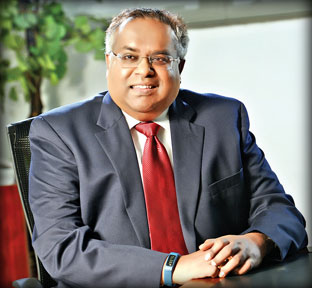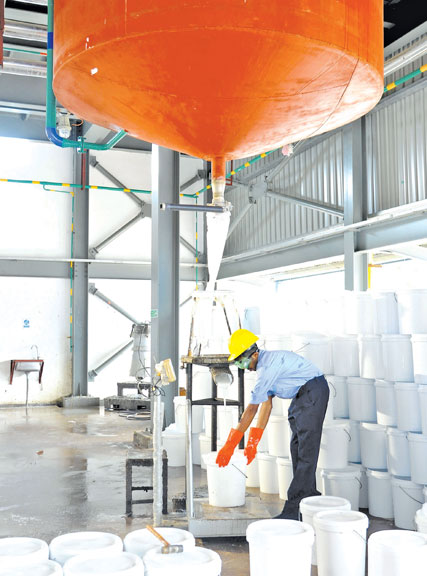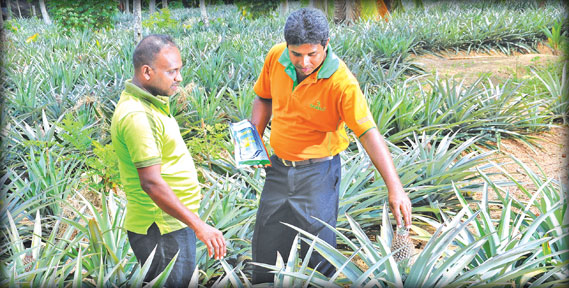How CIC gets decent returns from agriculture
Younger generation unwilling to sweat it out without
better returns:
By Chandani Jayatilleke
Agriculture might not be seen as an exciting business in this era of
software apps that enrich entrepreneurs virtually overnight, but CIC
Holdings determination to succeed in this 'traditional' sector is
yielding results. Agriculture or the business of providing nutrition to
the people, as Samantha Ranatunga, Managing Director / CEO of CIC
Holdings calls it, is the group's core business but it is also into
other sectors like pharmaceuticals and industrial chemicals. In this
interview, he outlines the group's approach and what's needed to revive
a key part of the economy.
Excerpts
|

Samantha Ranatunga |
Question: Could you describe how your company has performed in
the face of challenging conditions in recent years?
Answer: It was another difficult year for the corporate sector
with elections and the changing political situation. However, CIC Group
recorded revenue of Rs. 26.67 billion and a net profit after tax of Rs.
1,633.83 million reflecting strong growth of 13% and 57% YoY in the
financial year of 2015/16.
The CIC Group has been successful in strengthening our position in
key business segments, significantly increasing the value delivered to
stakeholders in a year of intensifying challenges.
Favourable weather conditions and a renewed government interest in
food security supported growth of the agricultural sector, which is also
expected to benefit from the Food Production National Program 2016-2018
of the Ministry of Agriculture.
Now we can look back with satisfaction - as we made the right
decisions at the right time to improve our core areas - by simplifying
our model and ensuring there is no dissipation of capital, no
dissipation of energy or skill. Basically we focused on the areas where
we could maximize our chances of return. With that what we tried to do
is to focus ourselves and develop core areas - agriculture output and
agriculture input, the livestock business, industrial chemicals and
health and personal care business. We focused on these areas and brought
investments. We moved away from areas where we thought we had limited
expertise - like B to C (business to consumer) and continue to deal with
B to B (business-to-business). So this model has paid dividends in the
last two years.
Q: How do the political changes affect the business of a
company like CIC?
A: Our company is entwined with agriculture; and on the other
hand agriculture in this country has political overtones and any change
in the subsidy scheme can create negative or positive impact in the
agriculture sector as well as in the political environment. As a leading
company, what we have done is building capacity in certain areas - for
instance, we grow the basic crops in this country like rice, corn,
vegetables; we produce milk and chicken and we are involved in providing
nutrition to the people. Our journey has been relentless in building
capacity and expertise and value addition in these areas. We have found
out with this kind of capacity, we are immune to some kinds of political
changes - because we are not only dealing with inputs; we are dealing
with outputs. When you deal with inputs there are environmental lobbies
and toxicological lobbies to manage with. But we work with outputs -
such as dealing with farmers, their produce and adding value to the
products and reselling it in the local and export markets. That way we
have managed to keep ourselves fairly immune to the political pressures.
We have also focused on improving farmer welfare.
Q: How do you assess the role of agriculture in the overall
economy? What potential remains untapped?
|

CICís many business areas - agriculture to chemicals |
A: Sri Lanka needs better quality genetic material - this is
not GM or anything of that nature. We need to get high yielding, more
drought resistant, weather resistant and pest resistant varieties.
Basically we have to think of food security issues and go on that
journey now. As a company contributing to the growth of agriculture we
are a part of that journey. We also hope to focus on minimizing post
harvest losses, and that the products that are available in the market
are of high quality. The next step will be to use modern technology and
value addition.
Q: Agriculture is a much talked about subject but its
contribution to the GDP remains quite low. What are the problems?
A: Agriculture is talked about for different reasons. It is a
vote base. And it is a fact that a disproportionate amount of people are
involved in it. About 30% of the population is involved in agriculture;
but contribute only 10% to the GDP which is a disproportionate amount.
There are very few outside investments in the sector. Intrinsically
it is subsidized or there is subsidy nature to the whole exercise -
people think to do agriculture, you need subsidies.
However, the younger generation today desire it to be very rewarding
or they try to get out of it because they do not want to be sweating in
the fields unless they get a decent return - that I think is one of the
compelling factors that is going to take agriculture to a level which is
competitive.
What we see today is that farmers do not want to toil in the fields
for the same returns their parents got a generation ago. They want more
or they want to get out.
For politicians, the farming community is a vote bank; they keep
agriculture as a kind of rotational thing - which is easier to identify
and address during the times of elections, but may be move away when you
really do need not them because their GDP contribution is minimal.
That is the bane of agriculture. We are not taking agriculture to
where it should be, because we are not giving the right inputs; we are
not giving the right value addition; we are not giving the right prices
for the output; we are basically not allowing it to move forward. If we
move forward, sometimes the dynamics of the complexities of addressing
the voter base (farming community) may change.
I think Sri Lankans are a resilient nation; this is a fact, which has
been proved over and over in the past. CIC works a lot in rural areas;
we go out to the field a lot and meet the farmers. CIC itself has 30,000
farmers; some are out growers. Now what we find is the second generation
is more discerning as they don't want to basically be mucking about in
the field unless they get a decent return. They often question - do you
have better varieties? Do you have off-season varieties? Can we plant
vegetables during the lean period so we get a better return?. We like to
work with such farmers who are bucking the trend. That is why we have
the SOORA Goviya competition to choose the best young farmers in the
country - who are under 35. That we started because we want to keep
youngsters in agriculture.
Q: Do you think the next generation of farmers would move away
from being part of this 'vote base' so that they are independent and
would be able to do better?
A: From a subsidy base, they will definitely move out. They
will think in a broad way. They may ask themselves - "do I need to do
paddy; Can I grow corn; I can grow vegetables, or banana?" - depending
on their ability to understand the bigger market opportunity. In most
areas, young farmers no longer wait for the subsidy. They will make
intelligent decisions.
We have to cultivate as a habit and support the market. If there are
no products to market it becomes a problem. Farmers need to have good
quality input material. These are some of the issues we as companies
have to address and encourage farmers who want to do new things in this
sector. We should ensure they have an opportunity to do that. Then what
happens is that the subsidized farmer can be looked after separately.
Q: Although agriculture is still not a major contributor to
the economy despite government support and subsidy, we have become a
nation with an oversupply of rice?
A: Today unfortunately we are over producing rice; that means
excess stocks of rice are going to the animal feed industry due to lack
of proper storage facilities when we have a bumper harvest. Imagine when
the country has a million tons of rice in excess - that going to animal
feed is a crime. We need to produce varieties of rice that can be
exported and that can be sold at a higher price.
CIC has had great success in this area. We export rice to the value
of nearly 4 million dollars every year. These are varieties of health
rice. Therefore, we pay our farmers a much higher price for paddy
because we sell that rice around Rs. 150 to Rs. 160 a kilo. There is no
use of producing unpalatable Naadu, when you can grow Suwandel which can
be sold at Rs. 120. We need to get those equations sorted out.
The young farmers in Sri Lanka are an intelligent lot. They are tech
savvy; they join various associations; they are in social media; they go
on line; hence they get market intelligence easily and find out any
information. They go through a self discovery period. CIC trains 1,500
young farmers every year. We have residential facilities, lecture rooms
and farms for practical learning. Those who follow these training
programs have the ability to practice most modern techniques of
agriculture. They also have the opportunity to become our out growers -
when they join the out grower scheme, they get a guaranteed price from
us for their produce.
Q: Should the farmer's image be changed and youngsters taught
to look at farming as a rewarding profession?
A: Yes. Once, we launched a young woman farmer campaign by
advertising in the media and through billboard in key places. They
depicted young women in jeans with mobile phones, walking across paddy
fields carrying paddy. However, it was ridiculed by some people in our
society. These narrow-minded people could not understand that the life
of a farmer changes as the generations change. Farmers should be modern
and they should earn well and be self-sufficient. They should get good
markets, and should be able to sort out their cash flow issues. That is
the role we like to play in our society. We work on social aspects, they
also need knowledge aspects. Unfortunately Sri Lanka's agriculture
sector has very little mechanisms to reach the farmer. We plan to play a
key role in minimizing this gap.
Q: Graduates with degrees in agriculture often join other
professions, moving away from the agriculture sector. This deprives the
agriculture sector of much needed professional inputs, especially in the
R and D sector.
 A: Most of the university students doing agriculture often use
our farms as training grounds today. We are also very supportive of
this. At present we are working with the Eastern University to create a
curriculum for the university. They want a more practical and private
sector oriented study program for their students, so that they can
become employable graduates. Today the university students have only a
limited choice of seeing proper agriculture farms - that is with CIC and
Hayleys. There are no proper government agri-farms. A: Most of the university students doing agriculture often use
our farms as training grounds today. We are also very supportive of
this. At present we are working with the Eastern University to create a
curriculum for the university. They want a more practical and private
sector oriented study program for their students, so that they can
become employable graduates. Today the university students have only a
limited choice of seeing proper agriculture farms - that is with CIC and
Hayleys. There are no proper government agri-farms.
I always encourage agri graduates to stay in their field of
specialty. For instance I have addressed the Uva Wellassa University's
students in the entrepreneurship stream. I tell them not to move away
from agriculture. I want to tell those who study agriculture
entrepreneurship to bring in value addition to the agri sector and raise
professionalism within the industry. Our job situation is still
stereotyped and blue collar workers are not duly accepted in society. We
have become victims of these social structures. So there is a huge
deficit for mechanics and carpenters. Therefore, we must create an
environment where youth can earn lucrative money through agriculture. It
can be done through building capacity, providing financial education and
market and investment knowledge.
On the other hand the government has initiated several programs to
encourage the farming community. There's an event to choose the best
farmer - the winners are recognized by the head of state. Such programs
should continue around the country as we need more stakeholders and more
involvement.
Q: What are CIC's future plans for creating a more sustainable
agriculture sector in Sri Lanka?
A: We should take advantage of weather patterns. We will go
for 'short duration' rice. Now what happens is rice gets destroyed in
the middle of the season due to floods, rains and drought - like what
happened in April. We have developed a two and a half months variety;
that could be a major game changer. It is to fight weather - but it is
economically beneficial to the farmer.
For politicians, the farming community is a vote bank; they keep
agriculture as a kind of rotational thing Ė which is easier to identify
and address during the times of elections, but may be move away when you
really do need not them because their GDP contribution is minimal. |

